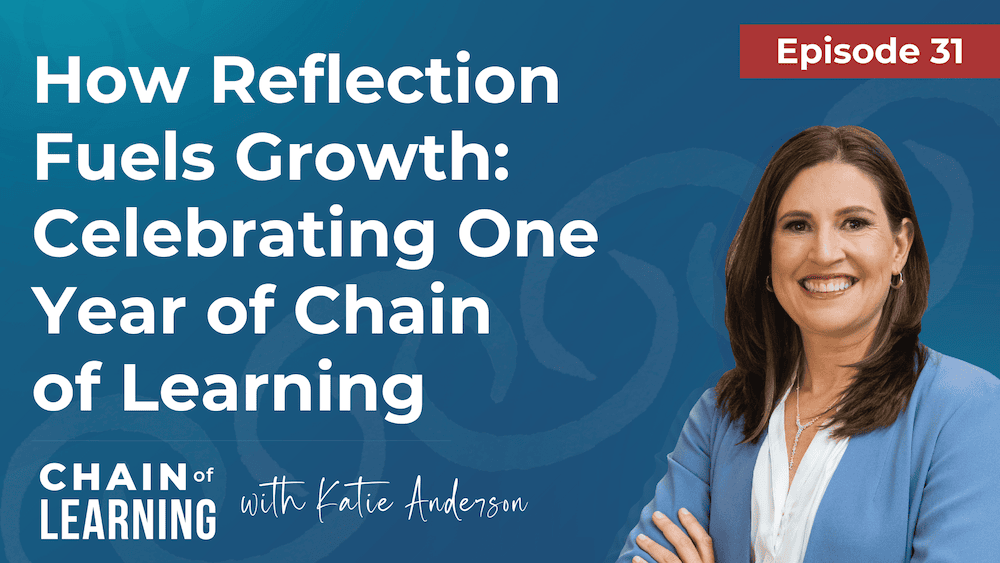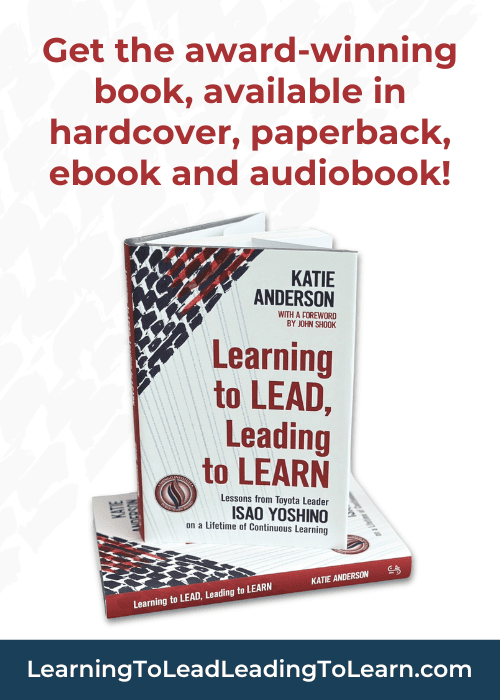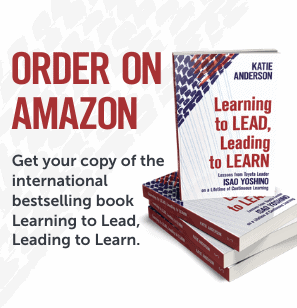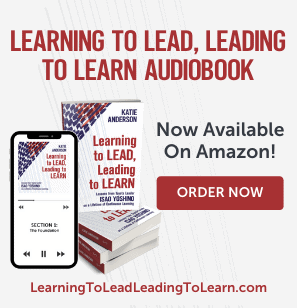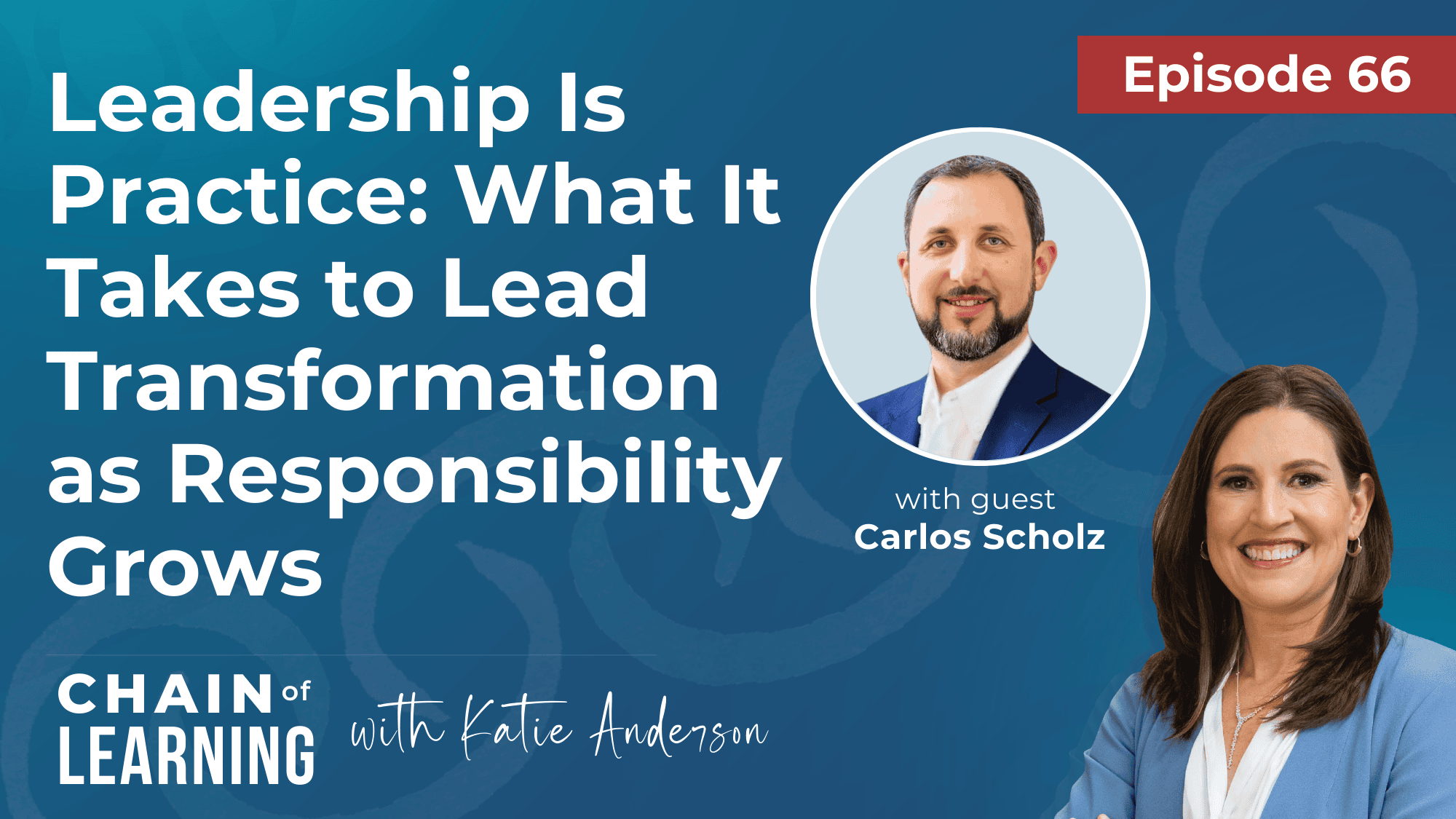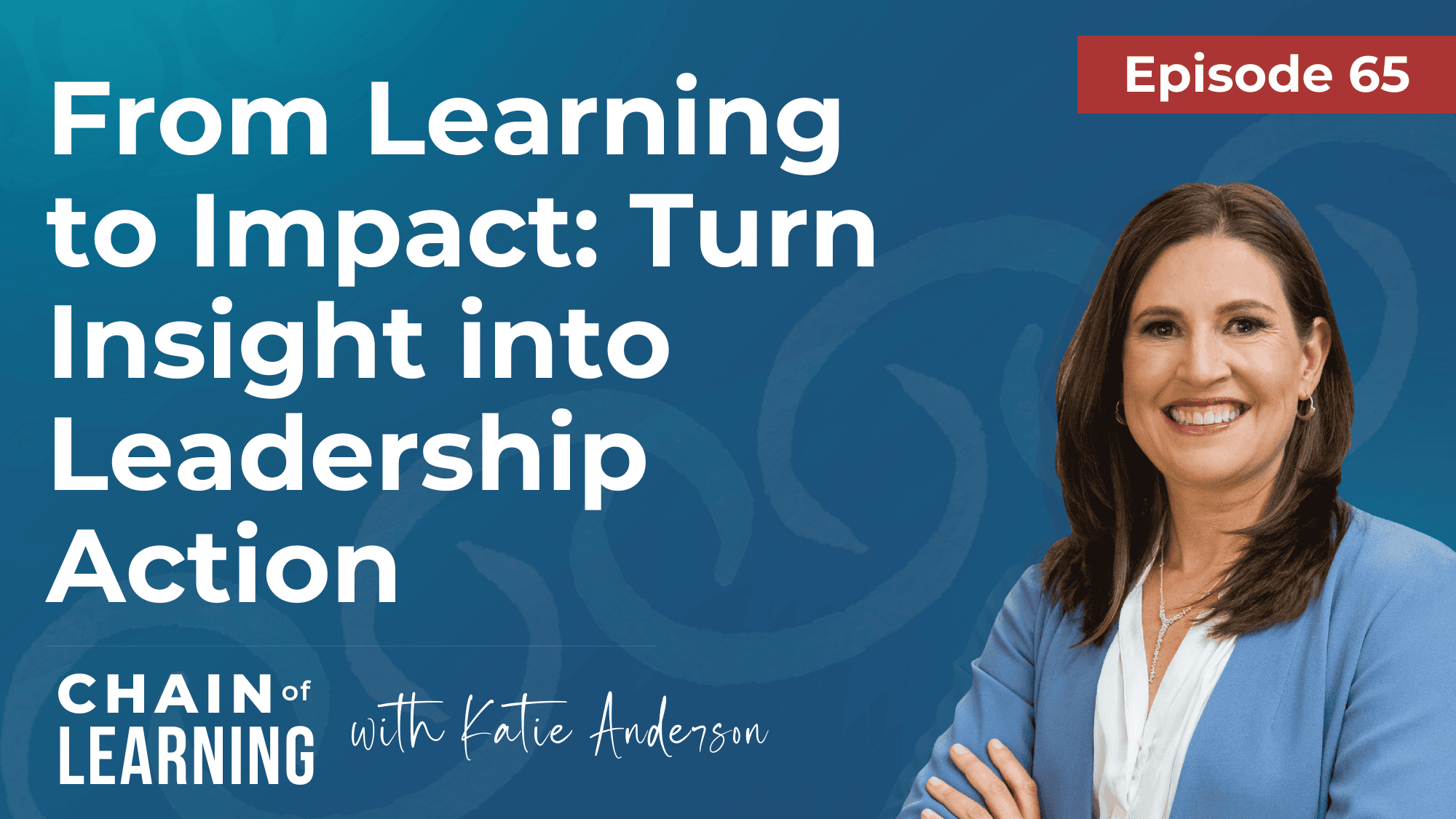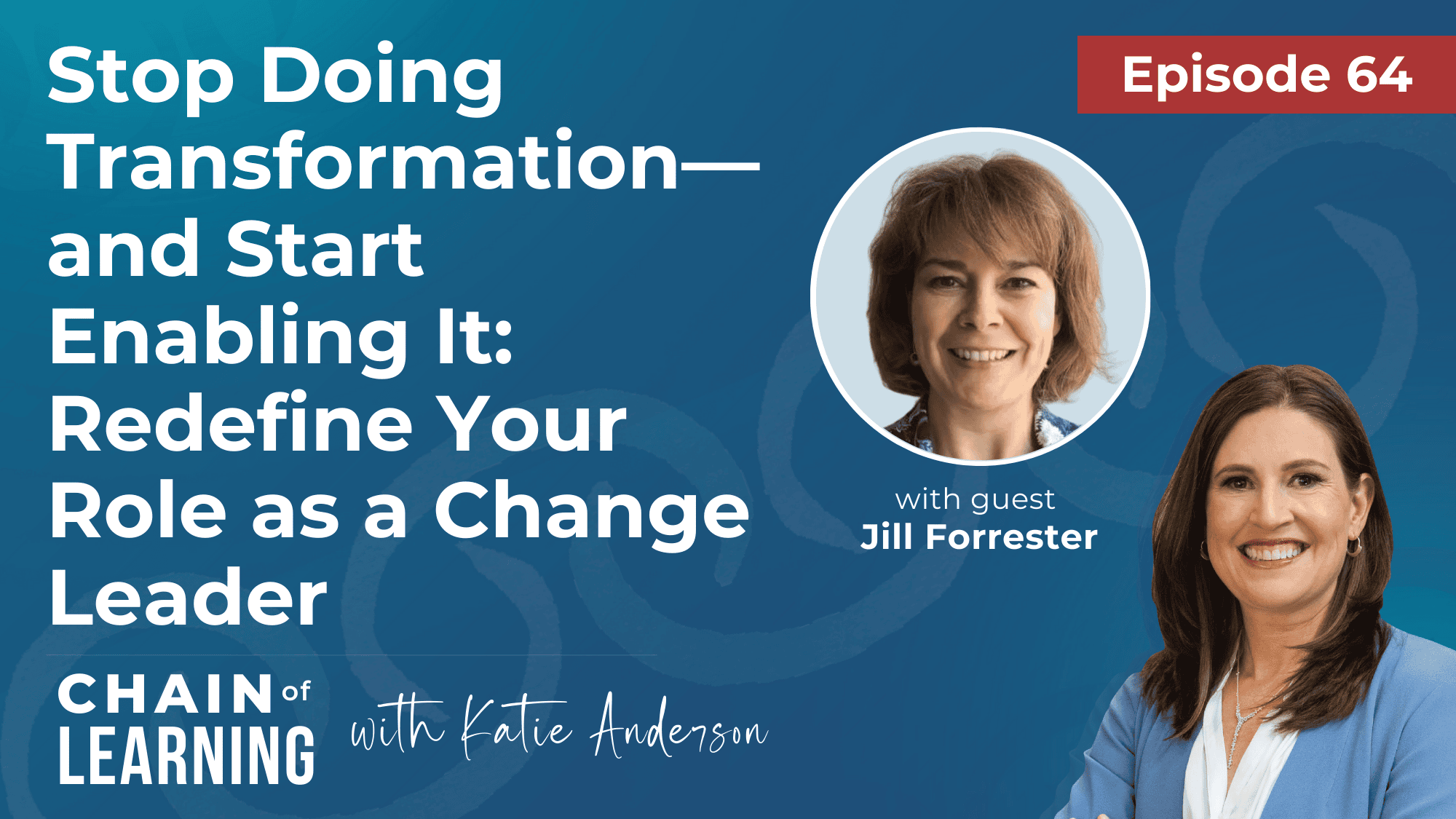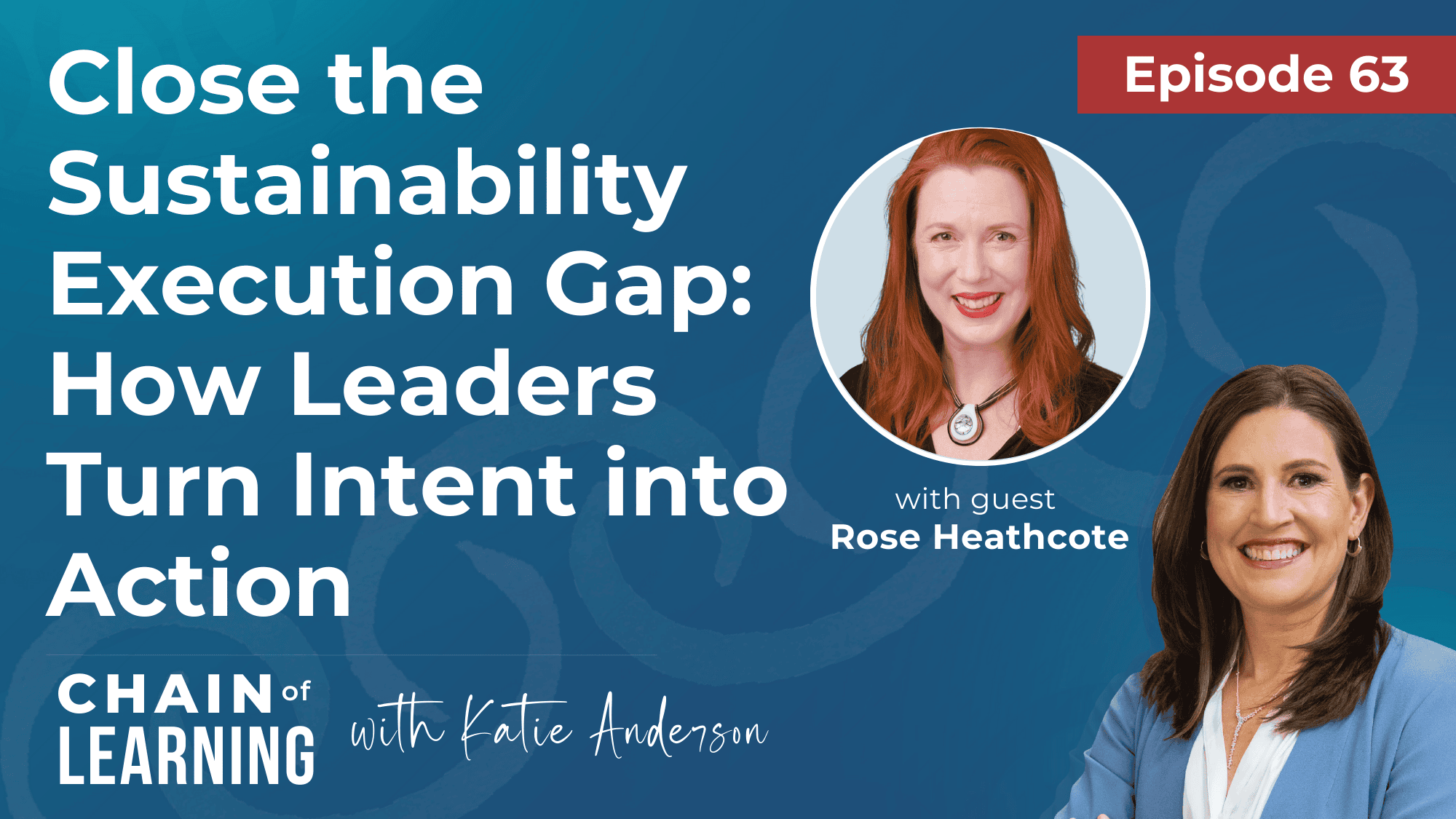The Process That Transforms Leadership and Innovation
It’s Chain of Learning’s first anniversary this month! And it’s the time of year for gratitude and thanks – and for reflection.
Thank you for listening and for being part of this Chain of Learning that we are growing together.
To mark this podcast milestone, I want to practice what I talk about on nearly every episode – reflection – as I believe it IS the foundation of learning and impact.
In this episode, I share my reflections from the Chain of Learning’s first year and walk you through the process I use and teach for reflection – so you can apply this same reflection process to whatever you are working on, both professionally and personally.
Whether you’re leading teams, fostering innovation, or driving continuous improvement – or simply looking to take the next step forward in your life – purposeful reflection is the foundation for your ultimate success.
Thanks for the opportunity to grow and strengthen our Chain of Learning together. Here’s to the journey of growth and another year of reflections ahead!
In this episode you’ll learn:
✅ The meaning of the Japanese word Hansei – self-reflection – and the risk if you get caught more in doing and don’t take time to reflect
✅ How you can use the Plan-Do-Study-Adjust (PDSA) cycle to improve and why I suggest we call it the Study-Adjust-Plan-Do (SAPD) cycle
✅ The 3 ways to reflect with intention even while short on time
✅ The backstory to how this podcast started and personal reflections of what I’ve learned and adjusted over producing 31 episodes
✅ The questions to ask yourself for meaningful reflection
Listen Now to Chain of Learning!
Tune in to discover how you can embed reflection into your practice — not just as a one-time exercise but as a regular habit – that guides you toward excellence.
Watch the Episode
Watch the full episode on YouTube.

Reflect and Take Action
I’ve shared my reflections and learnings from the journey of creating this podcast, but now I want to hear from you. How has this episode shaped your perspective on reflection? Is it a regular part of your process? What insights have you gained about the impact of reflection—both personally and in the organizational change you’re driving?
There are three powerful ways to reflect:
- Immediate Reflection – After an event, take a moment to reflect. How did it go? Jot down your thoughts and review them.
- Reflect with Others – Gather feedback in group settings to share ideas and insights.
- Reflect Over Time – Look back at your growth. Celebrate what you’ve achieved and recognize the progress over the past year.
Reflection is more than just a practice—it’s a tool for growth and transformation. How will you use it to drive forward?
Important Links
- Comment and share your process for reflection here on LinkedIn
- Work with Me
- Follow me on LinkedIn
- Get my book “Learning to Lead, Leading to Learn”
Related Podcast Episodes:
- Connect with your purpose: Episode 4: Leading for Impact: The Power of Being Over Doing
- The importance of Hansei and reflection: Episode 22: Leading to Learn Part 2: The Power of Reflection with Isao Yoshino
- The #1 Chain of Learning podcast episode: Episode 3: A Growth Mindset is the Foundation of a Continuous Improvement Culture with Carol Dweck
- How becoming a learning enthusiast will serve you personally and professionally: Episode 15: 5 Steps to Revitalize Lifelong Learning
- The distinction between the performance zone and the learning zone: Episode 5: Achieve More by Performing Less with Eduardo Briceño
- How to become a more skillful facilitator: Episode 26: Harness the Power of Storytelling in Leadership to Inspire Action with Carol Cox
Listen and Subscribe Now to Chain of Learning
Listen now on your favorite podcast players such as Apple Podcasts, Spotify, and Audible. You can also listen to the audio of this episode on YouTube.
Timestamps:
2:37 – The meaning of the Japanese word Hansei
4:11 – The 5 steps to applying Hansei and using the (SAPD) cycle
5:28 – Reflection Process 1: immediate self-reflection after an event, even if you’re short on time
6:27 – Reflection Process 2: reflect with others or in a group setting to get feedback and share ideas
8:05 – Reflection Process 3: reflect over time by looking back
9:38 – Backstory of how the Chain of Learning podcast started
12:37 – Process launching the podcast and the challenges and lessons learned
18:53 – Personal growth and what I have learned over time since starting the podcast
31:47 – Questions to ask yourself to add reflection in your daily, monthly, and yearly process
31:35 Share your process for reflection on LinkedIn or via email
Full Episode Transcript
[00:00:00] Welcome to Chain of Learning, where the links of leadership and learning unite. This is your connection for actionable strategies and practices to empower you to build a people centered learning culture, get results, and expand your impact, so that you and your team can leave a lasting legacy. I’m your host and fellow learning enthusiast, Aimee.
[00:00:20] Katie Anderson, this month marks the one year anniversary of the launch of this podcast chain of learning. And I wanted to take time to celebrate and reflect with you in the spirit of Thanksgiving. Today, we’re talking about reflection and gratitude, gratitude for learning and the connection between us in our chain of learning together.
[00:00:39] You hear me talk about reflection in almost every episode, as I believe it’s the foundation of learning and improvement. I want to share with you as I reflect on the first year of the show, not just what I’ve learned about the process and iteration of creating these 31 episodes over the past year, but the process of how I reflect.
[00:00:58] I’m going to take you through not only my own personal reflection, but also the process of reflection so that you can apply it to whatever you’re working on to reflect, learn, apply, and improve. First and celebrating this milestone of one year of the podcast. I want to thank you for listening and subscribing to the show in just one year.
[00:01:18] Chain of learning is ranked in the top 5 percent of podcasts globally with nearly 15, 000 audio downloads in over 100 countries in nearly 8, 000 hours of listening and watching time on YouTube. My purpose, which I described in episode four about the power of being over doing is to connect the hearts and minds of people around the world so that together we can make it a better place.
[00:01:42] So thank you for helping me fulfill my purpose through this podcast. I’m grateful for you and the learning that we’ve had together from it. I’m also grateful for the learning I’ve had from all the guests I’ve hosted on this show, and I’m grateful for the learning I’ve had about myself and the growth that I’ve had through launching and creating this podcast.
[00:02:01] In thinking about this episode, I wanted to take a moment to share my reflections from you about the past year of the podcast, not just in the concept of reflection, but actually how I apply reflection and how you can do it too. I want to practice what I talk about on the show all the time, the power of reflection and take a step away from the show to go through my reflection process with you.
[00:02:24] Reflection is the most powerful practice that impactful leaders and people leverage because it’s where learning happens. Through intentional practice, reflection, adjustments, and keeping going and learning. The Japanese word Hansei means reflection or self reflection. It’s the deep inner examination of personal actions and processes to understand what could be improved.
[00:02:48] I talk about this concept of reflection back in episode 21, when I’d sat down to reflect with Toyota leader Isao Yoshino about our book, Learning to Lead, Leading to Learn, and what we’ve learned in the four years since its release. As I shared in that episode, I almost titled the book Practicing Hanse because so much of the book was about reflection and learning from reflection, looking back over time and looking back in the moment.
[00:03:13] Reflection is where we learn. Reflection is the study part of the plan, do, study, adjust with a check in the plan, do, check, act cycle of continuous improvement. Though, I like to challenge us to rename it the Study Adjust Plan Do Cycle, because we always forget or don’t take the time to really reflect. We get stuck in the plan, we’re stuck in the do, and we’re just do, do, do, do, do, but we’re not really learning.
[00:03:39] And we don’t know if the actions we took are really having the impact that we want, or if we didn’t. meet the goal or the outcome that we wanted, we’re not really taking time to really intentionally think about what we could do differently and what we need to adjust. So if we want to get better and we want to continuously improve and we want to ultimately achieve those higher goals, we have to spend time in intentional reflection in studying and then adjusting.
[00:04:09] So how do you do this? How do you really practice reflection or Hansei? The first is to. Study before you’re doing. Set your intention or your goal. How do you want to show up? What do you want to achieve? And what do you expect to happen as a result? Frame what you want to do as an experiment, then plan for what you’re going to do, take action, actually do it, and then make sure that you go back and you’re reflecting and studying what actually happened.
[00:04:40] What have you learned? And then adjust. What will you do differently? Again, it’s the study, adjust, plan, do, and let’s make sure that we’re taking time for the reflection. There are several different ways that we can reflect, and I’ve used different aspects of reflection in my own personal practice for continuing to make this show better and better for you, and for my own process and growth.
[00:05:03] But what’s important is that in each episode, I ask. How can I do it better and easier? What have I learned? So there are a few different ways that you can practice reflection. And I’m curious to learn for you too, what you found is helpful for you. And it’s hard. Sometimes we don’t have a ton of time to reflect, but what’s important is about being intentional for it, regardless if you have five minutes, a half an hour, or a few weeks.
[00:05:28] So the first way to reflect is immediately or after a specific step. Ask yourself, how did it go just now? What were my intentions for practice or how I was going to show up? For me, for an episode just after I record, which I’ll be doing shortly, I think about what was my intention for what I was really going to put into practice?
[00:05:47] How did it actually go? Ideally, I write it down and then can review it later. Even if I only have five minutes before transitioning into making dinner for my kids or on to the next call, I’m intentional about thinking about how did that actually go right now and making a few notes for myself. It’s about being conscious and intentional about the reflection.
[00:06:08] So it might not always work for you to write things down, but that’s okay. Sometimes I don’t do that either. What we want to do, what adjustments do we want to make, and what did we learn is what’s important. So, the first part is about taking your individual reflection immediately or shortly after you’ve taken a specific step.
[00:06:27] Another way to reflect is then reflecting with others, reflecting with a group, or reflecting with a coach. And I do this a few different ways. A few times a month, I check in with my podcast coach to reflect on my performance and to get his feedback too. I share my reflections about how it went after each episode, and then I get to hear his insights as well.
[00:06:48] And you know what? Sometimes I think I did a lot worse than it really came across in the feedback that he gives me. And other times he points out corrections that maybe I wasn’t aware of. And this is the power of a coach to also help hold up the mirror for you, to see things from a different angle that you hadn’t seen from, but also to give you feedback and adjustments for how you can continue to improve and get better and to show you the way.
[00:07:12] So having a coach can be really, really helpful, not just in your process of reflection, but also understanding what adjustments you’re going to make. Another way I reflect with others or a group is to reflect with my team. So collectively, we look on the production side. So really, how are we working together as a team and what’s the impact the show’s having?
[00:07:33] What are some of the trends that we’re experiencing? How is the team functioning together to pull everything together from the editing to the video, to the show notes and so much more, and also looking at the data to understand what episodes seem to resonate more with listeners like you or all the other information that can help us see the impact that the show is having.
[00:07:55] So that’s the first process of reflection. So taking reflection individually or with others immediately after an action or a specific step. The other kind of reflection is more long term, looking back with perspective over time, whether it’s a year like I’m doing right now, or over 40 years like I did with Mr.
[00:08:17] Yoshino looking back over his 40 year career at Toyota. When we look back over time, we can see connections. with trends. We can celebrate growth. So this episode is really all about looking back over the course of time, over the course of the year. And at my podcast, not just what I learned from doing each individual episode or the impact of a specific episode, but is the podcast overall fulfilling the promise that I set out with?
[00:08:46] Is it aligned with my why for you and for myself? To have this longer term reflection, I knew that I had to be very intentional and take some carved out time. So to prep for today’s episode and my reflections, I grabbed my notepad and my computer and went out to my back porch to my favorite spot in the corner in the shadow of the redwood trees on a warm early fall day and sat with it, sat with the mess.
[00:09:12] Sat with the process, went back to my notes from where we started and looked at my notes from all the shows and episodes. And I went through the same process of reflection that I laid out for you earlier in this episode. I started with my intentions. What did I plan on doing? And then what have I learned along the way?
[00:09:30] So now that we’ve covered the process of reflection, I want to dive into my reflections and my learning from the one year of creating this podcast. I want to take you on my personal reflection journey that I had under that shady Redwood tree and in the process of talking with my coach and getting feedback.
[00:09:49] As I shared in the process of reflection, we have to start with where we were starting from. What did we intend to do? What did we expect to happen? So I actually had to go back, look at what I planned for and how I got started. And you might not even know, how did this podcast chain of learning get started in the first place?
[00:10:09] You might not know the backstory. So I want to share a little bit of this to give you context for what I’ve learned over the 12 months since then. So let me take you back to the summer of 2023. I had been doing video and audio content for years. I’d recorded the audio book format for my book, Learning to Lead, Leading to Learn.
[00:10:29] I had been periodically interviewing authors in my network and putting the video up on the on YouTube and had decided to put up the audio content in a very informal podcast format so that you could listen to it. Many people in my network from my business manager to my publicist and more had been telling me that I should start a podcast, but I’d really resisted.
[00:10:54] Creating a formalized podcast with a set schedule, just like this, because I was worried about being locked in. I was worried about having to put out content at a specific cadence and, uh, maybe that the stress that would give me, but then everything changed. With an email, I was in the room that I’m recording this podcast in right now.
[00:11:14] And I remember opening the email. It was from Larry Culp’s team at GE and inviting me to be part of this big event that they were putting on in September of 2023 called the Lean Mindset. Where they wanted me to come as a podcaster in an influencer in the lean and continuous improvement space to interview global thought leaders like Carol Dweck and other CEOs of companies such as PG& E and Uber and more, and to share my learnings and takeaways with, uh, with you.
[00:11:51] And. Although I had been dabbling in podcasting, I thought, Hmm, this is the calling saying I need to start a podcast, but it wasn’t really ideal timing. My business manager was out about to go out on maternity leave. I was about to head out on a series of keynote speaking and leading another Japan study trip program.
[00:12:15] My all stars were aligned and now was the time. You know, in a lot of things that happen in our lives, the stars are aligned saying it’s time to jump in and get started, even though the timing might not be perfect, but the time was now it was going to be messy and muddy and fun. And it was time to dive in.
[00:12:36] So I jumped in. The first thing I did was to hire a podcast coach. Thanks Tim. And get started. I knew. My intention for this podcast chain of learning was to focus on audio first and video second. I believe video is really important. I wanted to put the video up of the episodes on YouTube and be able to share shorts on LinkedIn and other places, but I wanted a high quality audio format podcast.
[00:13:04] I also knew that I wanted this podcast, if I was going to do a series for a regular podcast, to be more intentional and purposeful rather than ad hoc interviews, and that I wanted to move beyond just interviewing authors in my network to also include other types of interviews from practitioners that I work with to other thought leaders who may or may not have a book to solo episodes.
[00:13:31] And I also wanted this to be a container for intentional reflection and learning for myself. I found that writing my book, Learning to Lead, Leading to Learn was an incredible opportunity for me to really get clear on my own perspective. And I wanted to formalize a process for me to give me the structure to have to create content, to reflect and to put things out there, um, to really crystallize my, my own thinking.
[00:14:01] Because although I know I have another book in me, I am not quite ready to start writing it, but I wanted this structure for my own reflection and ongoing learning and to be able to share content and thoughts with you and get your feedback as well. So I wanted to use those thought leader muscles and having a podcast was something that was going to help me be forced into thinking and creating.
[00:14:20] So now that I had my coach and we had only two months to really move fast to figure out the whole structure of the podcast and record those first episodes, it was go time. One of the first decisions to make was in the name, I was debating between leading to learn, which was the informal podcast title that I’d leveraged from my book’s title or chain of learning, which is a concept that I have been using for years to talk about how we are linked together as learners and leaders.
[00:14:48] And I decided on chain of learning as it was really this concept of how we’re connected together in learning. And then there are other back, you know, back end things that you have to work on. What’s your podcast art going to look like? What’s the music going to be? And oh my gosh, the deciding on the music was so hard.
[00:15:07] I remember walking the streets of Tokyo, literally listening to different clips for the, my podcast coach was sending me and trying to figure out which was going to give the right vibe. And then literally we were waiting for the decision up till the. you know, a week before the first podcast episodes were launching.
[00:15:27] And I was at a conference going around asking a few different people to listen to my final two primary contenders. So it was a bit, it was a big decision to make, but at the same time we just had to go and make the decision. So I hope you like the music and I also decided it’s okay, we can change it.
[00:15:45] Down the line, nothing is permanent. We also decided to drop three episodes on the same day for the launch of the podcast. So this would include a solo episode of me, a discussion with my friend and fellow lean mindset influencer, Jamie Parker, and an interview with global thought leader, Carol Dweck, the author of mindset and starting the podcast because of the lean mindset event was totally the right call, even though the timing wasn’t right, it was the forcing function for me to get going.
[00:16:21] My episode with Carol Dweck, episode three, is the most listened to episode across all platforms of the podcast. So it was the right call to take, to seize the day, to take advantage of that opportunity to not only meet Carol Dweck, but also to have a one on one interview with her for you here on the podcast.
[00:16:41] And so we got going and the rest was history. And I’ve been reaching your podcast player every two weeks since then. So that’s the backstory of where I was started literally a year ago in leading up to launching the podcast. And before I go into what I’ve learned since then, I want you to To think about something that you have set out to do and maybe haven’t taken the time to look back with some perspective.
[00:17:09] This could be a project, a new personal goal for yourself, a new company initiative that you’re helping your clients lead. Maybe it’s creating a new division or a reorg structure in your department, or you’re trying to get started with a continuous improvement change initiative for your entire organization.
[00:17:30] If you can go back now and go through this same process, think about where you started, what were your intentions, what were the goals you wanted to have, and then go through the same process and thinking about how you got started and where you’ve come from.
[00:17:49] One of the powers of reflection and why I’m taking this time to both reflect and share my reflections with you is that while starting this podcast and the experience of creating this podcast is one thing. Small thing in my whole career, what I’ve learned in the process of starting it and doing it. and learning from it is a process that I can pull through in anything that I do.
[00:18:13] And this is why I’m encouraging you to, to ensure that you’re going through a process for reflection, not just so that you can make improvements on the actual project or initiative that you’re working on currently, but also how you create this muscle, this muscle for reflection so that you can pull through that type of learning.
[00:18:32] So that you’re getting stronger and faster at improvement of going through that steady adjust plan do cycle over and over again and applying that learning so that you can accelerate your impact no matter what you’re doing. So it’s time for my Hanse, my personal reflection on how I’ve done with my intentions for the show, how it, how it’s gone.
[00:18:53] And what have I learned? So a few things here. I, you know, I set out with some personal growth for myself in how to get started with a new format. You know, I mentioned that I’ve been doing audio and video content for a long time. Um, and I really wanted to challenge myself to grow and learn a new format and crafting more intentional episodes rather than just jumping in and doing an interview.
[00:19:19] So even though I am comfortable having a conversation, doing interview or being interviewed on a podcast or other formats, I wanted more structure to these episodes and to shape the beginning and end and share a little bit of my perspective on the topic with you. And learning a new format was definitely a challenge and way harder than I expected.
[00:19:42] And the thing is, I got in my own way. I was starting to be that perfectionist and wanting to make sure that I’d written everything out and that, you know, I, I sounded natural and, and good, but you know, it was really hard. And if you go back to some of those earlier episodes, I probably didn’t sound as natural as I wanted to be.
[00:20:03] To get over this expectations and perfectionism that I was putting on myself, I really had to lean into being a lifelong learning enthusiast, which I talked about in episode 15 and embrace a growth mindset, which I talked about with Carol Dweck and allow myself to learn while putting out content, which is hard.
[00:20:23] I had to stay in this learning mode, this growth mode to let the pressure off of myself to not feel like I had to be perfect and that it was okay to learn and grow publicly. And I was going through the same struggle that I talk about in any learning cycle. And I, and I share this with leaders who are not only coaching people in their organizations to take on new skills and habits, but for themselves too.
[00:20:48] And. There is struggle in learning something new, in doing something, in getting to develop our expertise. And it’s this discomfort with struggle that can be really hard. So I had to lean into the struggle, but be willing to have a learning mindset. Some things didn’t go always as I expected, and it can’t always be, it’s not always easy to stay in that learning mindset.
[00:21:14] It was really helpful actually to have a conversation with Eduardo Briceño back in episode five, where we talked about achieving more by performing less and this concept of the difference between when we need to be high performance and when we can have learning time. And sometimes it’s getting comfortable with performing and learning at the same time.
[00:21:37] So at first I scripted out. All of my solo episodes and I probably spent, I don’t know, five, six hours just writing out and trying to create the perfect flow for the episodes or the intros and outros of my interviews. I wanted the right structure, the right content, but, ah, it was so frustrating because it was taking hours and hours and hours and in looking back and listening to some of those episodes, I do sound like more, I was reading a little bit like how I was reading my audio book.
[00:22:08] Rather than having a conversation with you and talking and exploring concepts, which I’m hopeful I’m sounding more like I’m doing now because I’ve taken off some of that pressure. I still have structure, but I have a lot more flexibility. So those first handful of episodes were so hard and when those first three episodes dropped in November 2023 I was like, oh my gosh people said they were great.
[00:22:35] But whether they really just being nice to me I had to take a deep breath and know that okay. It’s out there. We’ve gotten started and now I can keep going And reflecting and learning and improving, just like I talked about those micro learning processes. How do we reflect at the beginning, get feedback and continue to improve each and every episode.
[00:22:55] I was a beginner again, a beginner with some skills, but a beginner in this format, and it was hard. And this is a struggle when we learn anything new and it’s okay. But the great thing is. Each episode, each time it got easier because of the reflection process I had for each show and the feedback I was getting through my coach and my team.
[00:23:14] And now I’ve gotten to a point where I’m a lot more confident about creating outlines without scripting the whole thing. And just like in episode 26, where I talked about how to become a more skillful facilitator, it’s about having structure with flexibility. The same thing goes for this format here. I need to have a structure or an outline of what I want to say and some of the key points but to have it more flexible so that I can say something in the moment and, and like having a real conversation with you.
[00:23:40] And that can be hard to get, you know, into that flow. So I’m working on this each and every show, but it’s getting easier with each iteration. And I also had to keep in mind some advice that Karen Martin gave me. Karen was my guest back on episode 11. And when I was writing my book, she was super helpful in giving me some advice about when to stop editing my book and to be okay to publish it.
[00:24:09] She said, You know, your book is going to be one moment in time when you hit publish and you’re going to keep learning and your perspective is going to grow and change or maybe how you’ve phrased something, um, changes or evolves before you talk about a concept and that’s okay. And it’s the same thing, although probably on a more micro scale here that sometimes I’m going to put out something and it’s there and it’s, you know, it’s.
[00:24:32] or sort of semi permanent, because you can always go back and change something. But really, I’m not going to go back and change these episodes once I publish them. And it’s okay for them to be imperfect, and it’s okay for my perspective to change and evolve. The important thing is that it’s out there, and it’s a moment in time.
[00:24:50] A year in, 31 episodes, more reps under my belt, I’m getting better, more comfortable, and I’m excited to commit to another year or more of this podcast, and a key learning, it’s humble. to be intentionally putting yourself in a place of learning. But the more we can do that, and the more we can bring forward this attitude of learning in whatever we do, the more impactful we’re going to be, not just in what we’re personally learning, but how we help other people learn too.
[00:25:15] Those are my reflections on my personal growth and delivering and creating each of the episodes. A second. Reflection is about the whole process of the creation of the entire podcast. How is my team functioning together? All the elements that create a podcast, you know, it’s not just the audio content, it’s the video and the video editing and the audio editing and the creation of show notes and the coordination of getting things up on the podcast players to distribute to all the channels and so much more.
[00:25:49] Creating a podcast. Has a lot more elements than I even knew about when I was getting started and it was really important to figure out the coordination. And as I mentioned earlier, it wasn’t the perfect time for launching a new podcast. Not only was I busy with a lot of international travel in the fall of last year, my business manager was going out on maternity leave, but you know, that’s how life goes.
[00:26:15] And I did hire a few. Fabulous podcast coach and audio editor, Tim and other key team members came forward to help with the launch. We had to figure out the right internal process for managing all the different aspects of the podcast and the video and the audio editing. And it was hard. I had to make some changes to different team members and this happens.
[00:26:37] We have to find the right fit. That’s going to mesh together and the right team and the right process. But now a year in, I think we’re there. And the back end. Which you don’t have a lot of visibility to is functioning really strongly. One thing I was not expecting to be as challenging in the production besides the actual creating of the podcast was the show notes.
[00:26:57] They are a lot more challenging to create than you might think. Yes, AI can help, but do they don’t always pull out the key parts that you want? And I had several different people helping me create the different show notes. And I’ve learned, I’ve had to let go a little bit. This is where my perfectionism was getting in the way.
[00:27:13] Like what was the perfect show notes and you know, what should be included. But I’ve come to the point that as long as the show notes reflect my voice and the key points of the episode, it’s good enough. I’m also trying to now get ahead by recording at least two episodes in advance or three weeks in advance.
[00:27:31] Sometimes, you know, I can batch a few based on my travel schedule, but not always, but I don’t want to get caught in a crunch time, which we were doing in the beginning because we’re just trying to keep that cadence of every two weeks. And that was a bit stressful. So, Being able to be more planful in advance and find the time and get into this rhythm and the fact that it’s not taking me so much time to develop the outline or the what I want for the episode is so much easier.
[00:27:58] So the flow is happening both for the team process, but also my individual process and. What I’ve also learned through this is that you have to make choices. You have to make the choices on what are the things you really care about being at a super high level or what is good enough and does it really matter to the customer, to you?
[00:28:20] And was I being more picky about certain things? And the thing is, we’re continuing to evolve and to learn and adjust and figure out what’s not only most important to you, but what’s important to me and staying true to that. So, As we reflect to think about the process and how you can continue to make the process side smoother and easier.
[00:28:40] I also started this podcast because I wanted it to positively impact you. I am so proud of the impact the podcast has had in a year and that we have over 15, 000 downloads and that it’s in the top 5 percent of podcasts globally. But what makes me the happiest is when I hear your feedback and comments.
[00:28:59] When I hear from you or other listeners on YouTube, comments on LinkedIn, sending me a note via email or leaving a review, it helps me not only know what’s resonating with you, but it gives me the encouragement that people are listening and that what I’m putting out there is actually having an impact on them.
[00:29:18] All this struggle, all this time, all this learning for myself personally is also, uh, worth it because it’s helping you grow and learn from the episodes, from the content, from my discussions with the other guests and from my solo episodes as well. Your comments, your feedback gives me ideas. It feeds the inspiration for the show.
[00:29:40] It keeps me passionate and it keeps me going forward even through the struggle. I really value hearing from you and I love knowing that we are really growing our chain of learning together.
[00:29:55] As we wind down this episode on reflection and celebrating the one year anniversary of Chain of Learning, I want to go back to the importance of reflection and the bigger picture, that reflection is what’s going to enable you to achieve the things that you want to achieve. To be a great leader, to be a great person is about having reflection.
[00:30:18] And I’m going to continue to talk about this concept of reflection over and over again. It is the key theme of improvement and the key theme in our chain of learning. Be sure to take time to make time for reflection for yourself, And with others reflect in the moment or after a certain event or a certain step in a process and reflect with perspective.
[00:30:46] Looking back over time, like I’ve done here with you over the last year of some key learnings I’ve had and some challenges and struggles and some growth as well, I’ve shared with you my reflections and learnings from looking back on the process of creating this podcast, how staying in a growth and learning mindset is critical for us moving forward.
[00:31:06] and towards our goals and impact. It’s how we go through that process of struggle. It’s how we adjust and continue to learn. Reflection is the critical component to support your learning and your impact. Hopefully what I’ve shared here today will help you reflect better. That’s my gift for you as I look back and celebrate the milestone of one year of this podcast.
[00:31:30] And what I’ve learned from creating it for you. I want to have a conversation with you about reflection. Take a few minutes to jump on LinkedIn or shoot me an email and share your reflections on reflection. How has this episode influenced your thoughts about reflection? How do you reflect? Is reflecting even part of your process?
[00:31:52] What have you learned about your practice about the process and impact of reflection for yourself and for the organizational changes you’re leading? What’s helped you develop a habit of reflection or what’s gotten in the way? Let’s reflect together on the power and process of reflection. I’ll put a link to a LinkedIn post in the comments that you can comment on or simply start a new post and tag me in this episode in it and share your reflections about reflection at this time of Thanksgiving.
[00:32:22] I want to express my gratitude for you and thank you for listening and tuning in and truly being part of this chain of learning. It’s why I started this podcast and why I’m going to continue this podcast because it’s not just learning for me. It’s learning for you. It’s learning together. Thank you for being a link in my chain of learning today.
[00:32:42] I’ll see you next time.
Subscribe to Chain of Learning
Be sure to subscribe or follow Chain of Learning on your favorite podcast player so you don’t miss an episode. And share this podcast with your friends and colleagues so we can all strengthen our Chain of Learning® – together.

